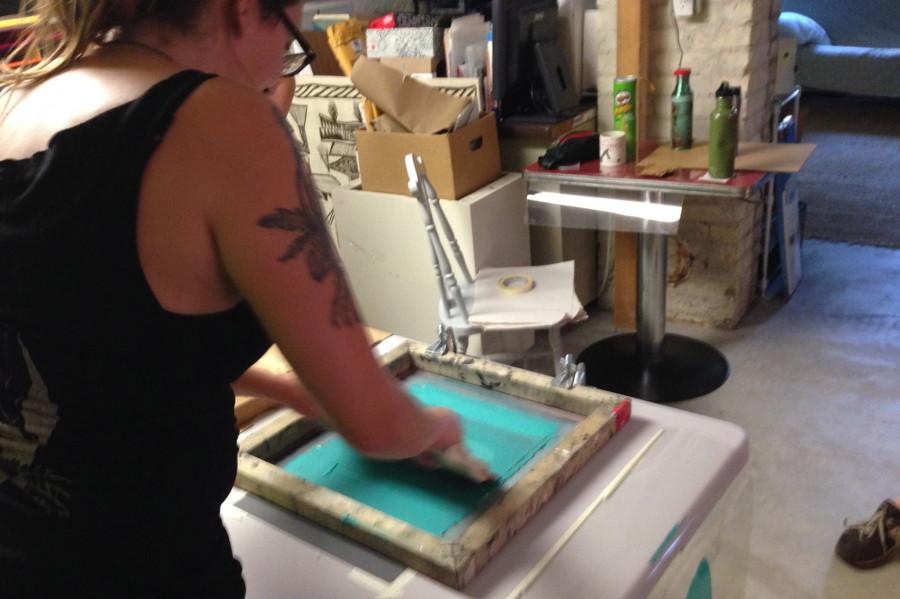
Zine culture began in a time when mix tapes were actually cassettes, animations were drawn with a pencil and paper rather than on a computer and subcultures relied on printed literature and word of mouth to stay connected.
Communities surrounding these do-it-yourself mini-magazines emerged from underground punks, independent comic artists, poets, fiction writers, political activists and science fiction enthusiasts, as a tangible way to share ideas and record their experiences.
For five years, the Milwaukee Zine Fest has been an outlet for local and national zinesters to continue to share their craft.
The main event will take place on Saturday, Nov. 3 from 11 a.m. to 5 p.m. at Falcon Bowl, where creators will set up tables and sell or trade their work. The night before, there is a kick-off event including a zine reading and dance party at the nearby Riverwest Public House.
According to Chris Wilde, one of seven organizers of the event, the Milwaukee Zine Fest is going to attract national and international zinesters from across the country as well as locally based artists from Milwaukee and Chicago.
“(Zine Fest) is a chance to meet the people who create the zines and also directly support them,” Wilde said.
“There’s no barrier, so you’re not going through a third party, you’re not paying a publisher for somebody else’s work where they may only see pennies on the dollar.”
Zinesters at the event will include comic artists selling unique prints and showcasing graphic novels, as well as zines on topics like punk rock, vegan cooking, political activism and even the hairstyles of rock and roll icons.
“Milwaukee has a really small and sort of dedicated (zine) scene,” Wilde said. “I think a lot of Milwaukee artists are actually probably more known outside of Milwaukee for their work than they are here locally. So one of the fun things about Milwaukee Zine Fest is that local people get a chance to find out who some of these people are who are doing nationally or internationally known work.”
Admission to the Milwaukee Zine Fest is free, and many of the zines can be bought at affordable prices or in some cases are given away for free. The organizers of the event – who in addition to Wilde include Jess Bubblitz Baumann, Erin Broskowski, Shannon Connor, Milo Miller, Joshua Sutton and Rebecca Targ – want to create a friendly environment for both people with no spending money who just want to see the zines, as well as collectors familiar with the artists.
Wilde, who has been involved in making zines in places like San Francisco, Minneapolis and Milwaukee, has been part of zine culture for more than 20 years. As a cofounder of qzap.org, the Queer Zine Archival Project, he aims to archive work on LGBT topics and make them available online.
Wilde says that the festival, as well as the work on his website, are indicative of the way many artists give back to zine culture and preserve the community and the work people have created over the years.
“Zines are very ephemeral, and sometimes only a handful of them were ever published,” Wilde said. “Somebody might print five copies and that’s it. So to be able to save those and share them with other people is a sort of exciting project for me.”
The zine community has inevitably changed with the development of the Internet, but Wilde has found opportunity rather than competition with the new technology.
“(Zines and the Internet) are very complementary because the Internet allows you to reach more people,” Wilde said. “I think it’s one of the tools that a zinester can use to make their craft better. It can be used to really promote and build an audience.”
But for many, the new electronic forms cannot replace the kind of hand-stapled, xeroxed or sometimes even hand-drawn work that goes into paper zines.
“There is a real power in holding a physical object that you know you created. I think the strength of this sort of zine-making will still continue in an age when everything’s about the Internet,” Wilde said.
Vincent Gaa, a Marquette student in the College of Education, is preparing to bring the first issue of his latest zine project to the event. Gaa, along with two of his friends, created a fiction zine called “Shades of Black,” which will feature original short stories and poetry.
“The reason why I like (making zines) is that it is something I do myself and that I can totally enter,” Gaa said. “The whole do-it-yourself movement draws me to it. I like having total control of what I’m doing.”
Beyond having this outlet for creativity, zine makers can find a community around making and exchanging their creative work. Gaa says he makes zines with his friends because he loves how the process is “working honestly with one another and just on this one thing, as opposed to working together under rules and guidelines like with a boss or work.”
The Milwaukee Zine Fest hopes to continue to be a haven for creators like Gaa. The organizers have worked hard to carry on the tangible, foldable, rip-able and physically shareable form that make zines so refreshing in a time when tech rules.


